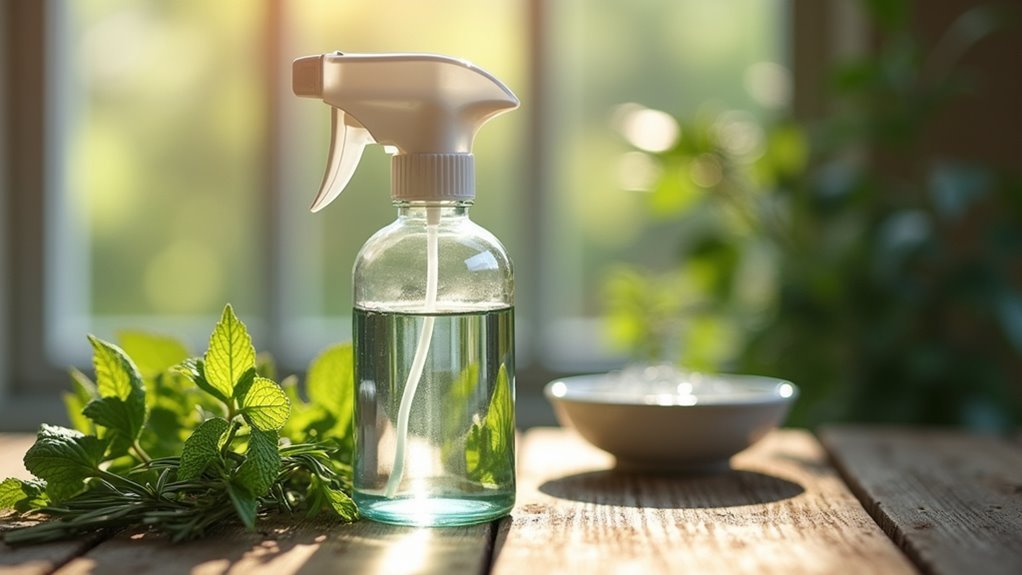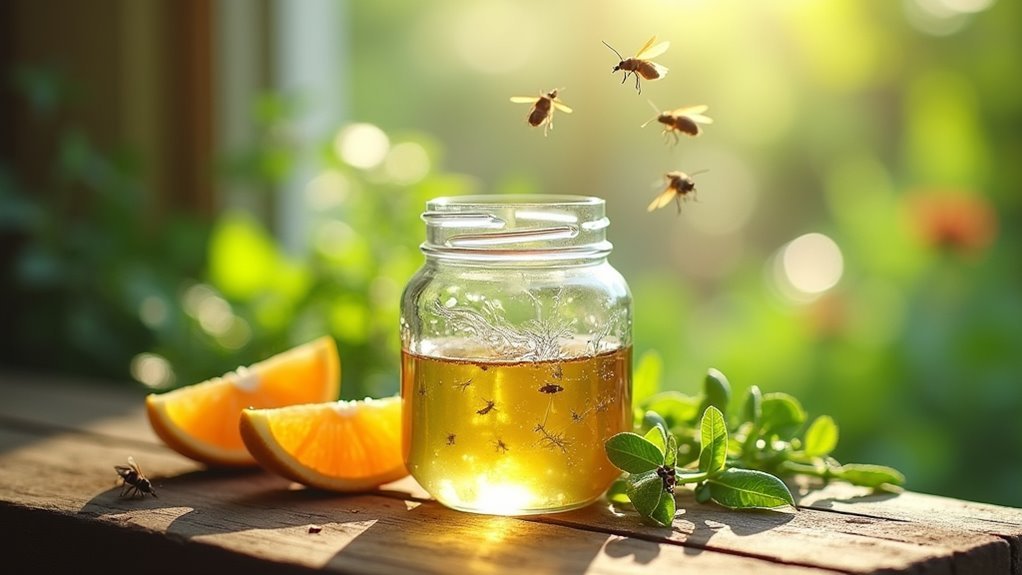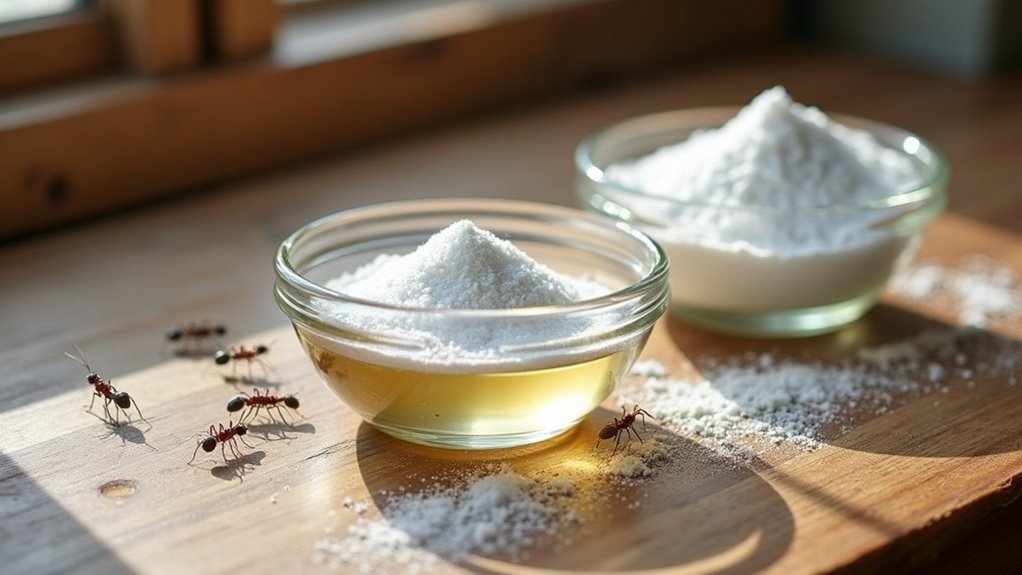You can repel mosquitoes effectively by mixing equal parts white vinegar or apple cider vinegar with water in a spray bottle and applying it to your skin and clothes. Create flying insect traps by combining vinegar, water, and dish soap in bowls near problem areas. For garden pests, steep dried herbs in vinegar for 1-2 weeks before spraying on plants. Build ant barriers using vinegar-water solutions combined with baking soda mixtures. These household ingredients offer the complete arsenal you’ll need.
White Vinegar and Water Spray Recipe

When you’re looking for a simple, chemical-free mosquito deterrent, you can create an effective spray using just white vinegar and water.
Mix equal parts of both ingredients in a spray bottle for this natural alternative to chemical-based repellents. The strong odor from white vinegar masks scents that typically attract mosquitoes to you.
You can apply this mosquito repellent directly onto exposed skin and clothing before heading outdoors.
While it won’t provide the extended protection of EPA-approved products, it’s an effective option for short outdoor activities.
Remember that reapplication every few hours is essential, particularly after sweating or water exposure.
This homemade solution offers a safe, accessible choice when you need quick mosquito protection.
Apple Cider Vinegar Mosquito Deterrent
Apple cider vinegar offers another accessible option for creating a natural mosquito deterrent at home.
You’ll mix equal parts apple cider vinegar and water in a spray bottle, then apply to exposed skin and clothing. The strong scent helps mask human odors that typically attract mosquitoes to you. The acetic acid in apple cider vinegar is believed to alter your body odor, making you less appealing as a target.
While anecdotal evidence supports its effectiveness as a mosquito repellent, scientific studies remain limited.
Beyond prevention, apple cider vinegar can treat existing bites when applied directly to affected areas, helping reduce itching and swelling for faster relief.
Vinegar and Dish Soap Flying Insect Trap

Beyond using apple cider vinegar as a topical repellent, you can harness its attractive properties to create an effective flying insect trap. This vinegar and dish soap combination works as both attractant and capture mechanism for flying insects like fruit flies and mosquitoes.
To make this trap:
- Mix equal parts vinegar and water in a bowl.
- Add several drops of dish soap to break surface tension.
- Place near kitchen counters or fruit bowls where insects gather.
The vinegar’s scent lures insects while dish soap prevents their escape once they land.
This non-toxic, environmentally friendly method effectively reduces insect populations without harmful chemicals. It’s a safe alternative to chemical insect repellents, providing reliable results using common household ingredients.
Herbal Vinegar Infusion for Garden Pests
While vinegar traps work well indoors, you can extend vinegar’s pest-fighting power to your garden through herbal infusions.
This herbal vinegar repellent combines acetic acid’s natural pest-fighting properties with aromatic herbs like garlic, rosemary, or mint. Create your infusion using one part dried herbs to four parts vinegar, steeping for 1-2 weeks before straining.
The resulting spray effectively deters garden pests including aphids and spider mites through strong odors and insect-repellent compounds.
Apply directly to affected plants or use as preventative treatment throughout your garden. You’ll need to reapply after rain or heavy watering for continued protection.
This eco-friendly solution offers bonus benefits beyond pest control.
After straining, use the spent herbs as a compost additive to enrich your soil naturally.
Vinegar and Baking Soda Ant Barrier

When ants invade your home, this powerful vinegar and baking soda combination creates an effective barrier that disrupts their navigation system while eliminating existing trails.
This natural repellent’s strong scent interferes with ant communication, making it an excellent method for repelling ants without harmful chemicals.
Here’s how to create your ant barrier:
- Mix equal parts vinegar and water in a spray bottle for direct application around entry points.
- Combine baking soda with sugar to create bait that attracts and eliminates pests.
- Apply the fizzing mixture of both ingredients to clean surfaces while maintaining the barrier.
This safe alternative protects children and pets from toxic chemical repellents while effectively controlling ant infestations through regular application.
Frequently Asked Questions
What Is the Most Effective Natural Bug Repellent?
You’ll find oil of lemon eucalyptus works best as a natural bug repellent, offering EPA registration and DEET-comparable effectiveness for two hours against mosquitoes and ticks, making it your most reliable natural option.
Why Is DEET Banned?
DEET isn’t completely banned, but you’ll find it restricted in some countries due to environmental concerns and potential skin irritation. The EU proposed limiting it in consumer products because it harms aquatic life.
What Essential Oil Do Bugs Hate Most?
You’ll find catnip oil tops the list – it’s ten times more effective than DEET against mosquitoes. Thyme oil’s also incredibly potent, providing over 90% protection at just 5% concentration levels.
What Is the Best Mosquito Repellent That Actually Works?
You’ll get the best protection from repellents containing DEET at 25% concentration or picaridin at 20%. These EPA-approved ingredients provide hours-long defense against mosquitoes, outperforming natural alternatives considerably.
In Summary
You’ve got five proven vinegar-based repellents that’ll keep pests away without breaking the bank. These aren’t just old wives’ tales—they’re effective solutions you can make right now with ingredients you’ve probably got in your kitchen. Don’t waste money on expensive chemical sprays when white vinegar, apple cider vinegar, and a few simple additions can tackle mosquitoes, flying insects, garden pests, and ants. Start mixing and protect your space naturally.





Leave a Reply